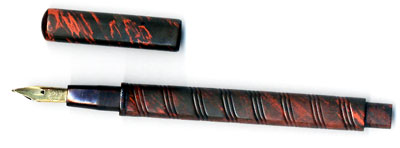| A Good Day Hunting Pens | |||
| Vintage treasure hunt by Len Provisor | |||
| Article # 133 | Article Type: Report | ||
| If you collect vintage pens as I do, we all have the dream of someday walking into a treasure trove of long forgotten pens stashed away in a back room or closet. It can happen, it has happened and it will happen again, hopefully sooner than later. On a recent
excursion I came across two rather scarce pens among a pile
of beaten "51"s, some Duofold Streamline pencils
and a pile of assorted Jotter ballpoints. Now, the
one that caught my eye was not the Parker Holy Grail, called
the "Pen of Pens" reputedly a solid gold floral
repousse eyedropper encrusted with gemstones. Very early eyedropper pens are getting harder to find these days, so when one comes my way I am extremely grateful for the chance to obtain them. My focus for the last few years has really been "51"s because they are everyday users, much easier to find and have a great variety of colors and cap designs which appeal to me. Laying
before me were a few "51"s with double jewels, very
used but decent , some very clean Duofold Sr. Streamline pencils
in Pearl/Black and Jade.
About 5 ¾" long and 3/8" cap diameter and I believe was first introduced on 1903. The Parker dealer magazine "Side Talk" describes "This pen is preferred by many who like the corrugated handle, which gives the fingers something to grasp and prevent from slipping when moist or sweaty." The nib is a #3 size and the slightly oversize barrel holds a very ample supply of ink. The model before me was produced in 1909, by the shape and taper of the distinctive section and sold at the handsome price of $6.00.
At this
period in Parker history one of the most aggressive among
competition was Waterman Pen Co. Both pen makers produced
excellent working writing instruments, therefore the focus
of marketing and consumer appeal in large part would employ
the distinctive designs and decorations of these pens. It
was at this time that high quality jewelry decoration wrapped
these pens from such silversmiths as Heath, Unger Bros. and
others. Elaborate sterling silver filigree and gold overlays
sold to the wealthy. Snakes, the famous Awaynu Indian "Aztec"
(inspired by his visit to Santa Fe, NM in early 1900) floral
repousse, pearl and abalone panels with gold bands and fancy
14K and 18K pens at $10. to $20.
The other
fountain pen was a 1932 Parker Combo or combination pen/pencil.
It is produced of a plastic material used during the Depression,
other pens produced at this time are also referred to as "Depression"
pens. This one is a dark brown or bronze color with a gold
speckle finish. I believe this was the only modern period
that Parker produced a Combo model. This is a patented model,
unscrewed from the mid-section, was a button filler and featured
a ring clip like the Duofolds and had a small nib smaller
than a #2.
Described as "Here is something designed especially for bookeepers. It is a double fountain pen, one end for black ink and the other for red. The ink reservoir for the red ink is mottled red, which indicates at a glance the color of the ink in that barrel. The other end of the fountain is black, which also indicates the color of the ink therein. Every bookeeper who has seen and tried this is simply delighted with it. The fountain can be disjointed, if desired, thus making two complete fountains, in which event they can be carried in the pocket in the ordinary way." Many other combos were produced by major pen makers such as Waterman, Conklin, Schnell and Mabie Todd. Some were plain plastic, many were fancy sterling silver or solid gold. Most often the ones found today are of a lower quality, but are a very popular theme for many vintage pen collectors. Today
combos are back among modern pen makers. Some beautiful models
have been recently produced by Conway Stewart, Visconti, Bexley,
Lamy and some even have pens with as many as 4 different points
refills such as ballpoints in red, black, lead and a stylus
for a palm computers. Also very popular are laser pointer
pens for educators and lecturers. |
|||



